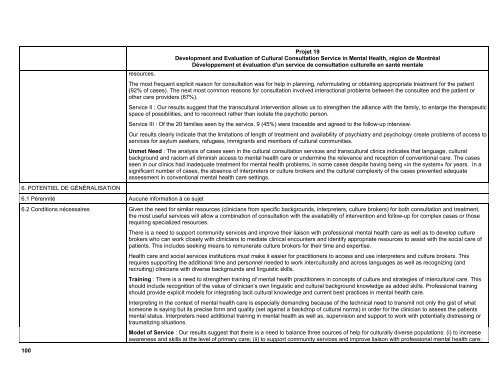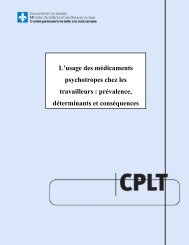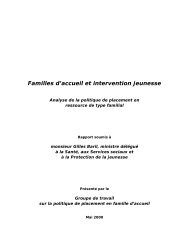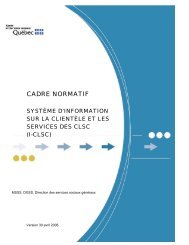De l'innovation au changement - Gouvernement du Québec
De l'innovation au changement - Gouvernement du Québec
De l'innovation au changement - Gouvernement du Québec
Create successful ePaper yourself
Turn your PDF publications into a flip-book with our unique Google optimized e-Paper software.
6. POTENTIEL DE GÉNÉRALISATION<br />
6.1 Pérennité Aucune information à ce sujet<br />
100<br />
Projet 19<br />
<strong>De</strong>velopment and Evaluation of Cultural Consultation Service in Mental Health, région de Montréal<br />
Développement et évaluation d'un service de consultation culturelle en santé mentale<br />
resources.<br />
The most frequent explicit reason for consultation was for help in planning, reformulating or obtaining appropriate treatment for the patient<br />
(92% of cases). The next most common reasons for consultation involved interactional problems between the consultee and the patient or<br />
other care providers (67%).<br />
Service II : Our results suggest that the transcultural intervention allows us to strengthen the alliance with the family, to enlarge the therapeutic<br />
space of possibilities, and to reconnect rather than isolate the psychotic person.<br />
Service III : Of the 20 families seen by the service, 9 (45%) were traceable and agreed to the follow-up interview.<br />
Our results clearly indicate that the limitations of length of treatment and availability of psychiatry and psychology create problems of access to<br />
services for asylum seekers, refugees, immigrants and members of cultural communities.<br />
Unmet Need : The analysis of cases seen in the cultural consultation services and transcultural clinics indicates that language, cultural<br />
background and racism all diminish access to mental health care or undermine the relevance and reception of conventional care. The cases<br />
seen in our clinics had inadequate treatment for mental health problems, in some cases despite having being «in the system» for years. In a<br />
significant number of cases, the absence of interpreters or culture brokers and the cultural complexity of the cases prevented adequate<br />
assessment in conventional mental health care settings.<br />
6.2 Conditions nécessaires Given the need for similar resources (clinicians from specific backgrounds, interpreters, culture brokers) for both consultation and treatment,<br />
the most useful services will allow a combination of consultation with the availability of intervention and follow-up for complex cases or those<br />
requiring specialized resources.<br />
There is a need to support community services and improve their liaison with professional mental health care as well as to develop culture<br />
brokers who can work closely with clinicians to mediate clinical encounters and identify appropriate resources to assist with the social care of<br />
patients. This includes seeking means to remunerate culture brokers for their time and expertise.<br />
Health care and social services institutions must make it easier for practitioners to access and use interpreters and culture brokers. This<br />
requires supporting the additional time and personnel needed to work interculturally and across languages as well as recognizing (and<br />
recruiting) clinicians with diverse backgrounds and linguistic skills.<br />
Training : There is a need to strengthen training of mental health practitioners in concepts of culture and strategies of intercultural care. This<br />
should include recognition of the value of clinician’s own linguistic and cultural background knowledge as added skills. Professional training<br />
should provide explicit models for integrating tacit cultural knowledge and current best practices in mental health care.<br />
Interpreting in the context of mental health care is especially demanding bec<strong>au</strong>se of the technical need to transmit not only the gist of what<br />
someone is saying but its precise form and quality (set against a backdrop of cultural norms) in order for the clinician to assess the patients<br />
mental status. Interpreters need additional training in mental health as well as, supervision and support to work with potentially distressing or<br />
tr<strong>au</strong>matizing situations.<br />
Model of Service : Our results suggest that there is a need to balance three sources of help for culturally diverse populations: (i) to increase<br />
awareness and skills at the level of primary care; (ii) to support community services and improve liaison with professional mental health care;

















